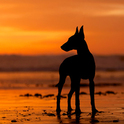There was a discussion in an Australian FB group alleging that I was a clandestine stooge for the ruination of purebred dogs. This isn't the first time this has happened. So I will post this here in response and also so people can refer to it when it comes up again. And it will come up again.
The poster's claims:
"aligned with pedigree dogs exposed?"
" love of designer dogs and cross breeding."
" the person running the programs own personal stance {should} be known.
____________________________________________________
I am happy to make it crystal clear who I am.
| I am a PhD scientist working on the genetics of purebred dogs. I founded the Institute of Canine Biology in 2012, which offers courses about genetics specifically for dog breeders. ICB also provides a wealth of information about genetics as it relates to dog breeding and, especially, improving the health of the gene pool and the dogs. I'm not sure what you mean by "aligned with PDE". I am a scientist. I don't have "views", or "bias", or any other personal sentiment about how dogs are bred. Everything I say is rooted deeply in science and facts that are well-established in the peer-reviewed literature. I don't have anything to say about the breeding of dogs that is not established, mainstream science. Consistent with that, I do not "love" designer dogs or "cross breeding". Those would be personal sentiments, and I have none about either. Again, I am a scientist working on the genetics of dogs; the genetics of designer dogs ae exactly the same as any other dogs, purebred, feral, or wild. My agenda is to provide to breeders the information they need to breed healthier, happier dogs. |
I do not have a "personal stance" about any aspect of dog breeding. I am not a dog breeder; I have no opinion about how to do it. I understand the science of breeding and the role of population genetics in determining the health of the gene pool and the population of animals. Everything I say is based on facts.
This isn't the first time somebody has rushed around fear-mongering about me. I am happy to tell you completely, clearly, exactly who I am and what I am doing. My "alignment" is to science, and to the professional scientists whose expertise and research is essential to understand how we can improve the breeding of dogs. I communicate with them, I collaborate with them, and I respect them. I get my information from them and the army of other scientists that are working towards improving the health of dogs, not from people on Facebook with opinions and no expertise. I suggest you do the same.
As a final note:
The International Partnership For Dogs (IPFD) is an organization of kennel clubs, canine health organizations, scientists, genetic testing organizations, and others involved in improving the health of dogs. They met just a few weeks ago in the UK to discuss issues affecting the health of purebred dogs. The producer of Pedigree Dogs Exposed was there, as she was for all of the previous meetings of IPFD. A committee was formed to address issues of genetic diversity in dogs, and she was placed on that committee. She has the respect of the people at that meeting, and if they respect her, so do I.
So stop the fear-mongering. Do your homework. Read the science. Learn something. Align yourself with the people that have the passion and expertise to do right by dogs and are working towards better health based on science.
ICB's online courses
***************************************
Visit our Facebook Groups
ICB Institute of Canine Biology
...the latest canine news and research
ICB Breeding for the Future
...the science of animal breeding


